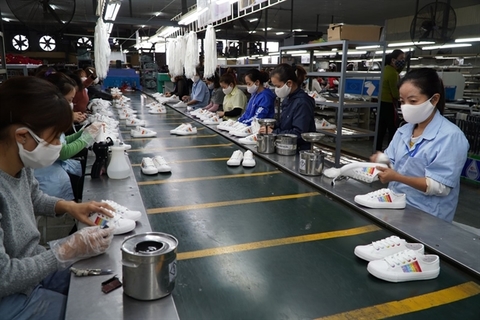
Viet Nam's export value of footwear in the first eight months of this year reached US$10.9 billion, down 8.6 per cent year on year.— Photo congthuong.vn
The domestic leather and footwear industry still has a chance to increase exports from now to the end of the year, but it will be unable to reach its export target of US$24 billion this year due to the COVID-19 pandemic, according to the Ministry of Industry and Trade (MoIT).
The Viet Nam Leather and Footwear Association (Lefaso) said the local leather and footwear industry will have a chance to increase its share in the global supply chain because China's market share in the world has decreased from 60-70 per cent to about 45-50 per cent due to the pandemic. Viet Nam and other countries including India, Indonesia, Philippines, Myanmar, Bangladesh and Cambodia are boosting exports to grab a larger slice of the pie.
Diep Thanh Kiet, Lefaso vice chairman, said that there is still an optimistic situation for production and business this year, saying that though export orders from countries have been greatly reduced, the situation is worse in countries that have struggled to control the pandemic.
As Viet Nam has controlled the pandemic well, Vietnamese footwear companies have faced a lower reduction in export orders than companies in rival countries, Kiet said.
According to the Ministry of Industry and Trade, consumption of the leather and footwear industry will continue to face difficulties because it depends on the ability to control the pandemic in the US and EU. The biggest driver for the industry's growth is the Viet Nam - EU Free Trade Agreement (EVFTA) that was effective from August 1. However, it is not easy to take export opportunities from this agreement.
The domestic leather, footwear and handbag industry has more than 1,700 businesses. About 85 per cent of them have limited capital, technical ability and technology and also have to import raw materials. Therefore, they need to build a supply chain of raw materials to take advantage of the EVFTA, the ministry said.
Some leather and footwear enterprises have said that firms in the industry need to work together to form production chains. For example, Vien Thinh Shoe Company produces soles, heels, nails and shoe ribs. Therefore, the company hopes to work with many other businesses in the industry to not depend on imported materials, reported Dien dan Doanh nghiep (Business Forum) newspaper.
According to Phan Thi Thanh Xuan, Lefaso vice chairwoman and general secretary, imports of raw materials have resumed but consumption is facing many difficulties. Companies’ production output has dropped by 40-50 per cent and orders have slowed. Most products are for export, so it is difficult to consume them in the domestic market due to high prices.
The ministry said the export value of footwear in the first eight months of this year reached $10.9 billion, down 8.6 per cent from the same period in 2019.
Therefore, it is almost certain that the Vietnamese leather, footwear and handbag industry will not be able to fulfil its export target of $24 billion this year.
The major footwear export markets of Viet Nam, such as the US, China, Japan, Belgium, and Germany, decreased footwear imports compared to the previous month. In the first seven months of this year, the US was the largest export market of Vietnamese footwear with a value of $3.43 billion, accounting for more than 36 per cent of the total export value, down 9 per cent compared the same period in 2019.
Exports fell by 19 per cent to $1.14 billion to China, 17 per cent to $554 million to Belgium, 2 per cent to $552 million to Japan and 10 per cent to $505 million to Germany.
Exports to Denmark dropped sharply by 64 per cent to only $6.2 million. — VNS